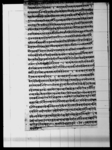A letter from Raṇavīra Siṃha Thāpā to General Bhīmasena Thāpa (VS 1892)
ID: DNA_0004_0100
Edited and
translated by Rajan Khatiwoda
Created: 2014-12-24;
Last modified: 2017-01-10
For the metadata of the document, click here
The accompanying edition, translation/synopsis and/or commentary are available under the terms of the Creative Commons Attribution-ShareAlike 4.0 International License
Abstract
This letter written by Raṇavīra Siṃha Thāpā from Pālpā in Tānasena to General Bhīmasena Thāpā requests clarification of lālamohara-s issued previously relating to theft, robbery and the death penalty imposed in cases involving the latter before a treaty with the British Indian Government was signed to prevent crimes, particularly cross-border theft and robbery.Diplomatic edition
[1r-part1]
नं४३९1स्वस्तिश्रीसर्वोपमायोग्यत्यादिसकलगुणगरिष्ठराजभारोद्धारणषड्गग्राहिकसामर्थश्रीश्री2श्रीश्रीश्रीदाज्यूजनरलभीमसेनथापाकाचरणतलइतश्रीरणवीरसिंहथापाकोसा
3ष्टांगदंडवत्कोटिकोटिसेवा़सेवा़सेवा़पूर्वकपत्रमिदम्चरणकाआसिर्वादलेञाहाँनीक
4ताहाँपाव़कुसलआनन्दमंगलचरणारधीरहुनुभयाहाम्रोसववातकोप्रतिपालउद्धार
5होलाआगेञाहाँकोसमाचारभलोछश्रावणवदि१३रोज५मालेषियाकोकरुणापत्रये
7हिसुदि३रोज३कादिनआइपुग्योहरफ्हरफ्पढिअर्थविस्तारसिरचह्राञाउप्रान्तःहा
8म्रा¯ ¯ ¯१¯ ¯कोरसर्कारकंपनीकोअवउप्रान्तःडाँकाजाहाँपर्छवाहाँकामालिक्लेसजाय
9गर्नुभन्यादोहराडाँकुकालिन्दिन्कावेव़राकारुक्काकोकुराअघितँलाइपनीलेषिग
10याकैहोसोहिव्यव़राकारुक्कारडाँकुकाकुरामाढुंडुलापिटाइउर्दिदिन्यावन्दोवस्तका
11रुक्कामालालमोहरभैजगाजगारवा़नाभयाताहाँपनिलालमोहर२जाँछन्पुग्नन्
12लालमोहोरवमोजीमकोकामनगरिगाफिलिगरिरह्यौभन्यालालमोहरमालेषियाव
13मोजीमसजायहोलासोजानीवहुतैतागितिगर्दैरहनुभन्न्याउर्दीजगाजगामापठाउ
14न्याकामगर्यावढियाहोलाभन्न्यासिक्ष्यालेषीआयेछवहुतजोग्यवढियाहो¯ ¯२¯
15पल्टन्काजागिरमादरियाकाषेतमाषोलापैरालेविगार्याकाषेतमध्येषेत२।१५भर्ना
16कोलालमोहर१महेस्वरपाँडेकानाउकोपुरानाकिलावमोजीमकोलालमोहर१र
17डाँकाकाकुराकोलालमोहर१डाँकाचोरिकाकुरामाउर्दिदिन्यालालमोहर१आ
18इपुग्यायेउटामानेपाल¯ ¯ ¯१¯ ¯रसर्कारकंपनिकाजौन्जगामाडाँकापर्छउस्ज
19गाकामालिक्लेडाँकामार्न्याकोसाजयगर्नुनेपाल¯ ¯ ¯१¯ ¯कामानिस्हरुलेसर्कारकं
20पनीकामुलुक्मागैडाँकामार्याभन्यासर्कारकंपनिवाटसजायगर्नुसर्कारकंप
21निकामानीस्हरुलेनेपाल¯ ¯ ¯१¯कामुलुकमागैडाकामार्याभन्यानेपाल¯ ¯ ¯१¯
22वाटसजायगर्नुभन्न्यावेव़राकोअघिल्लोयोपाठकोवन्दोवस्तलाईतेरातजवीज
23माकस्तोठहर्छभनिरुक्काकोमसौदापठाइवक्सनुभयाकोचाहिंमाभन्यादोहरोउर्दीदि
24नु१५।१५दिनमावढियाछउर्दिदिनुभन्न्यालालमोहरमाभन्यादोसिवा़नाकाज
25गामाडाँकुरचोरकावीद्दत्लेदोस्तिमाषलल्हुनजान्छदुनिञारैयेत्लाइपनि
26दुषहुनजाँछतस्अर्थचारवर्णछत्तिसैजात्माडाँकारचोरिकाकुरामासावीत्
27हुनगयोभन्याज्यूजाहान्मापर्लाभनिप्रगंनाप्रगंनामौजेमौजेमाढुडुलापिटाइदि
28नुअवप्रान्तःकचहरिमापनि१५।१५दिनमायेसैवमोजीम्कोउर्दीदि
[1r-part2]
29ताकितगर्न्याकामगर्दैरहनुभन्न्यावेव़राकोरहेछयेसैयेकोहरावेव़रालेअंग्रेज
30कोमुलुकमागैडाँकाचोरिगर्यौभन्याज्यूजहान्मापर्लाभनि१५।१५दिन्माउर्दि
31दिंदातहाम्रारैयेत्हरुकोसाह्रैमन्षस्नजालाअलिक्देसमापनिवदनाम
32पर्लाभन्याझैंपनिलाग्योवन्दोवस्तकोलालमोहरमायेक्वेव़राउर्दीदिन्यालाल
33मोहरमायेक्वेव़राहुनालेविन्तीगरिपठायाकोहोदोहरापाठकोवन्दोवस्तकाला
34लमोहरवमोजीमदोहरोउर्दिनेपाल¯ ¯ ¯१¯काअम्वलकामानिसलेसर्कार
35कंपनिकाअम्वलमाडाँकारचोरिगर्नगयौभन्यासर्कारकंपनीलेसजायगर्नु
36सर्कारकंपनिकाअम्वलकामानीसलेनेपाल¯ ¯ ¯१¯काअम्वल्माआइचो
37रिडाकामार्याभन्यानेपाल¯ ¯ ¯१¯वाटसजायगर्नुभन्न्या९१सालकाकार्त्तिक
38मैन्हादेषिवन्दोवस्तभयाकोछडाँकारचोरिकाकुरामासावित्हुनगयोभन्याज्यू
39जहानमापर्लाभनि१५।१५दिनमाढुंडुलापिटाइदिन्याहोकिअंग्रेज्सितका
40वन्दोवस्तकाकुराकोलालमोहरमाभन्याडाँकाकोकुरामात्रैरहेछउर्दीदिनु
41भन्न्यापछिल्लोलालमोहरमाभन्याडाँकारचोरिमासावितभयोभन्याज्यूजहा
42नमापर्लाभन्न्यारहेछचोरिकोकुरामा२लालमोहरमायेकवेव़रानहुँदाचोरि
43काकुराकोउर्दिदिउभन्यागाइभैसिवाप्राधानचोर्न्यालाइपनिचोरभनींछगा
44इभैसिवाप्राधानचोर्न्यासमेतलाइहोकिघरफोरन्यारविचमाडाँकामार्न्याला
45इमात्रैहोअघील्लामोहरवमोजीमकोदोहराकुराकाडाँकाकोउर्दिदिन्याहोकि
46पछिल्लायेकोहराकुराकावेव़राकोडाँकाचोरिसमेत्कोउर्दीदिन्याहो¯ ¯ ¯१¯मा
47विन्तीपारिवक्सनुभयाहुकुमआग्याआयावमोजीमउर्दिदिनलाउलावीग्ये
48चरणेषुइतिसम्वत्१८९२सालमितिश्रावणसुदि५रोज५मुकामपाल्पा
49तानसिंशुभम्¯¯¯¯¯¯¯¯¯¯¯¯¯¯¯¯¯¯¯¯¯¯¯¯
Translation
Number 439
Hail! This letter is preceded by [assurances of faithful] Service! Service! Service! [and] crores and crores of eight-point prostrations (sāṣṭāṃgadaṇḍavat) performed by Raṇavīra Siṃha Thāpā to the feet of [my] five times venerable elder brother General Bhīmasena Thāpā, a fit [model] for comparison, most venerable because of every [good] quality and capable of carrying out (lit. elevating) the king’s heavy tasks and of firmly holding a sword.
[We are] here fine by the blessing of [your] feet. If [your] feet there are well, happy, auspicious and steady, all our affairs will be protected and advanced. Furthermore, the tidings here are good. The compassionate letter written on Thursday, the 13th of the dark fortnight of Śrāvaṇa arrived on Tuesday, the 3rd of the bright fortnight. [After I read] each paragraph [of it], the extent of its meaning [was understood]. I bow down my head [to your feet].
[Regarding the] following: The letter of instruction [from you which states the following] has arrived: ‘The content [lit. matter] of the rukkā [containing] details of the mutual extradition of robber[s] has also been sent to you stating [the following:] “From now on wherever a robbery is committed, [either] at a location [in the jurisdiction] of our –1 [or] of the Company Government, the local authority (vāhā̃kā mālikale) shall administer punishment”. Lālamoharas have been issued and sent from place to place [relating] to [two] rukkā-s, [one the one containing] the above-mentioned details and [the other] [prescribing] arrangements for the proclamation (urdi dinyā) regarding [this] matter of robbers, [to be announced] by the beating of drums. [These] 2 lālamohara[s] will be going [and] reach there [where you are] too. It would be good if [you could] perform the task of sending from place to place the proclamation that [whoever] does not act according to [these] lālamohara[s] [but] contrary to [them] will be punished in accordance with what is written in the lālamohara[s]’.
This is very proper and good. The [four following] lālamoharas have arrived: [1:] The lālamohara on compensation for the 2 [murīs] and 15 [pāthīs] of kheta [granted] to the regiment of ---2--- as jāgira [but] destroyed by landslides and flooding [lit. river] on the kheta [next to] the river - - -1 [2:] The lālamohara reflecting the older border pillars under the name of Maheśvara Pā̃ḍe- - -1 [3:] The lālamohara on robbery- - -1 [4:] The lālamohara on the proclamation regarding robbery and theft- - -1
As to one [of them]: You had sent me a draft of the rukkā asking for my opinion [and containing the following] details: ‘Wherever a robbery is committed, [whether] at a location [in the jurisdiction] of Nepal - - -1- - - or Company Government, the local authority shall exact punishment [by] executing the robber. If persons under Nepal - - -1- - - commit robbery at a location [in the jurisdiction] of the Company Government, [the offenders] shall be punished by the Company Government, [while] if persons under the Company Government commit robbery at a location [in the jurisdiction] of Nepal - - -1- - -, [the offenders] shall be punished by Nepal - - -1- - -’. [My opinion is that] it would be good to issue double proclamations every 15 days.
[As to the lālamohara on] issuing the proclamation, it has [the following] details: ‘Because of robbery and theft in the cross-border areas, the friendship [between Nepal- - -1- - - and the Company Government] will suffer, and their peoples, too, will. Therefore, [the proclamation, announced by] the beating of drums, that anybody from the four varṇas and thirty-six castes shall be punished by death if [charges] of theft and robbery are proved shall be delivered in every courtyards/village (praganna-mauje). From now on the same proclamation shall also be delivered in kacaharis every 15 days’ and warnings continually issued’. It seems to me that if the proclamation is delivered every 15 days—that robbery or theft committed in the British-[Indian] territories shall carry the death penalty—our subjects will be very alarmed and the country will fall into some disrepute.
There is one detail in the lālamohara concerning arrangements [and] one [other conflicting] detail in the lālamohara concerning the proclamation, and therefore I have sent a request [for clarification]. The double proclamations based on the lālamohara concerning arrangements for the double readings—if persons from Nepal - - -1- - - territory go to commit robbery or theft in the territory of Company Government, [the offenders] shall be punished by the Company Government, [and] persons from Company Government territory go to commit robbery or theft in the territory of Nepal - - -1- - -, [the offenders] shall be punished by Nepal - - -1- - - are scheduled [to begin] from Kārttika of the [Vikrama] year [18]91. Should there be the beating of drums every 15 days [announcing] that if a robbery or theft is proved, the offender shall be put to death? It is seen to be the case that in the lālamohara concerning arrangements with British-[India] [the offender] is to be put to death only in the case of robbery, [whereas] the lālamohara [issued] later states: ‘if robbery or theft is proved, a death sentence shall be imposed’.
Regarding the matter of theft, [confusion arises] because the two lālamoharas do not agree in detail when ordering the proclamation concerning theft: whether one who steals a cow, buffalo or principle objects (prādhāna) is also to be called a thief. [Is it the case that] only one who breaks into houses and commits robbery [is to be called a robber], or is someone who steals a cow, buffalo or prādhāna also [included]? Should the proclamation be made according to the prior lālamohara [to allow for] a double field of application of robbery or according to the later lālamohara concerning theft as well as robbery, each with [its own] strict fields of application? If you could kindly request [clarification of] this matter from ---1---, I will have the proclamation delivered according to [his] order. [What more to say] to the feet of a knowledgeable one?
Thursday, the 5th of the bright fortnight of Śrāvaṇa in the [Vikrama] year 1892. From Pālpā, Tānasiṃ [Tānasena].


